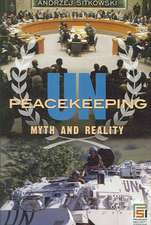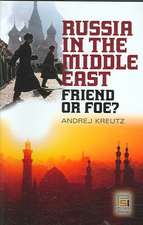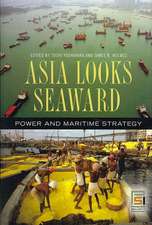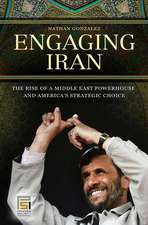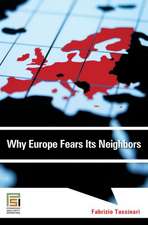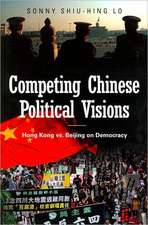The Terrorist Conjunction: The United States, the Israeli-Palestinian Conflict, and al-Qa'ida: Praeger Security International
Autor Alfred G. Gerteinyen Limba Engleză Hardback – 29 mai 2007 – vârsta până la 17 ani
Din seria Praeger Security International
- 18%
 Preț: 334.19 lei
Preț: 334.19 lei - 8%
 Preț: 335.53 lei
Preț: 335.53 lei - 34%
 Preț: 376.10 lei
Preț: 376.10 lei - 46%
 Preț: 443.64 lei
Preț: 443.64 lei - 29%
 Preț: 240.11 lei
Preț: 240.11 lei - 8%
 Preț: 304.56 lei
Preț: 304.56 lei - 34%
 Preț: 373.82 lei
Preț: 373.82 lei - 19%
 Preț: 412.79 lei
Preț: 412.79 lei - 19%
 Preț: 338.42 lei
Preț: 338.42 lei - 18%
 Preț: 335.62 lei
Preț: 335.62 lei - 27%
 Preț: 377.35 lei
Preț: 377.35 lei - 27%
 Preț: 376.75 lei
Preț: 376.75 lei - 18%
 Preț: 336.46 lei
Preț: 336.46 lei - 18%
 Preț: 321.73 lei
Preț: 321.73 lei - 27%
 Preț: 384.51 lei
Preț: 384.51 lei - 18%
 Preț: 320.50 lei
Preț: 320.50 lei - 18%
 Preț: 320.50 lei
Preț: 320.50 lei - 18%
 Preț: 321.35 lei
Preț: 321.35 lei - 24%
 Preț: 420.54 lei
Preț: 420.54 lei - 14%
 Preț: 335.99 lei
Preț: 335.99 lei - 18%
 Preț: 355.82 lei
Preț: 355.82 lei - 18%
 Preț: 319.83 lei
Preț: 319.83 lei - 18%
 Preț: 334.28 lei
Preț: 334.28 lei - 14%
 Preț: 335.14 lei
Preț: 335.14 lei - 38%
 Preț: 405.98 lei
Preț: 405.98 lei - 40%
 Preț: 571.34 lei
Preț: 571.34 lei - 18%
 Preț: 321.85 lei
Preț: 321.85 lei - 18%
 Preț: 323.25 lei
Preț: 323.25 lei - 18%
 Preț: 253.28 lei
Preț: 253.28 lei - 40%
 Preț: 571.50 lei
Preț: 571.50 lei - 14%
 Preț: 333.72 lei
Preț: 333.72 lei - 18%
 Preț: 301.73 lei
Preț: 301.73 lei - 19%
 Preț: 352.96 lei
Preț: 352.96 lei - 26%
 Preț: 387.80 lei
Preț: 387.80 lei - 18%
 Preț: 302.77 lei
Preț: 302.77 lei - 14%
 Preț: 333.91 lei
Preț: 333.91 lei - 17%
 Preț: 325.80 lei
Preț: 325.80 lei - 24%
 Preț: 338.58 lei
Preț: 338.58 lei - 34%
 Preț: 414.73 lei
Preț: 414.73 lei - 18%
 Preț: 354.30 lei
Preț: 354.30 lei - 29%
 Preț: 254.29 lei
Preț: 254.29 lei - 18%
 Preț: 354.11 lei
Preț: 354.11 lei - 18%
 Preț: 334.38 lei
Preț: 334.38 lei - 14%
 Preț: 302.68 lei
Preț: 302.68 lei - 18%
 Preț: 322.97 lei
Preț: 322.97 lei - 27%
 Preț: 376.50 lei
Preț: 376.50 lei - 27%
 Preț: 322.81 lei
Preț: 322.81 lei - 27%
 Preț: 382.91 lei
Preț: 382.91 lei - 18%
 Preț: 320.87 lei
Preț: 320.87 lei
Preț: 354.48 lei
Preț vechi: 518.63 lei
-32% Nou
Puncte Express: 532
Preț estimativ în valută:
67.83€ • 70.82$ • 56.14£
67.83€ • 70.82$ • 56.14£
Carte tipărită la comandă
Livrare economică 04-18 aprilie
Preluare comenzi: 021 569.72.76
Specificații
ISBN-13: 9780275996437
ISBN-10: 0275996433
Pagini: 192
Dimensiuni: 156 x 235 x 23 mm
Greutate: 0.45 kg
Editura: Bloomsbury Publishing
Colecția Praeger
Seria Praeger Security International
Locul publicării:New York, United States
ISBN-10: 0275996433
Pagini: 192
Dimensiuni: 156 x 235 x 23 mm
Greutate: 0.45 kg
Editura: Bloomsbury Publishing
Colecția Praeger
Seria Praeger Security International
Locul publicării:New York, United States
Notă biografică
Alfred G. Gerteiny is Adjunct Lecturer of History at the University of Connecticut in Stamford. He has, over nearly four decades, offered undergraduate and graduate courses, conducted research, and lectured in many universities around the world. Beginning in 1973, following the terrorist attack on the Israeli Olympic team in Munich, he designed and led seminars on terrorism. He has been a longtime media commentator on the Middle East, Africa, terrorism, and U.S. foreign policy.
Cuprins
Foreword by Jean ZieglerPrefaceAcknowledgmentsIntroduction1. On Political Power, Legitimacy, and Violence2. Anatomy and Physiology of Contemporary Terrorism3. Islam, Islamism, and Apocalyptic Terrorism4. Consequential or Reactive Nationalism-based Terrorism5. Terrorism and the Palestine Problem6. Human Rights and Israel's National Security7. The Neocons and the Dishonoring of AmericaAppendixNotesBibliographyIndex
Recenzii
[T]his book emphasizes how the terrorist actions of each side to help motivate and excuse the terrorist actions of the other. Gerteiny returns time and again to how and why the US has tended to miss the complexity of the situation and by providing an uncritical support for Israel has sucked the US democracy into the dance of mutually constitutive animosity. To continue down this path, he argues, disfigures US democracy and empowers the radicals the US claim to oppose. Recommended. General readers, upper-division undergraduates, graduate students, and researchers.
Gerteiny, a teacher on the Middle East, has combined his academic training and years of introspection on this subject in writing this book. He begins with an analysis of power, political legitimacy, and the role of violence within political entities. With this grounding, he dedicates the bulk of this work to the examination of terrorism--the organization and philosophies of terrorist groups and their relationship to the state. He looks more closely at Islamic terrorist groups and delves deeply into the role of terrorism in the Israeli-Palestinian Conflict. He also probes the relationship that has developed between the United States and terrorism. This book is extensively footnoted and the author offers a bibliography of scholarly sources that have helped to inform his understanding on this subject.
While few authors have examined in depth the Israeli-Palestinian conflict and its decisive role in contemporary transnational terrorism, Gerteiny analyzes state and anti-state forms of terrorism, and makes a distinction between terrorism carried out in pursuit of national liberation and the theologically driven jihadism that is fueled by it.
Sadly, one of the prime characteristics about the debates in the United State over terrorism and the war on terrorism has been the rather successful silencing of any discussion of the role of US foreign policy in spurring extremist Islamic terrorism, particularly US support for an expansionist and United Nations-defying Israel that is militarily occupying and oppressing millions of Palestinians. Thankfully, Gerteiny appears unafraid of these taboos, as he addresses unqualified US support for Israel and how it helps give rise to both Palestinian nationalist terrorism, aimed only at ending Israeli oppression, and Islamic jihadi terrorism, which is able to point to the US-Israeli nexus as the spearhead of a new crusader force in the region. He also criticizes the hypocritical support of the United States for dictatorships in the region while claiming to be supporting democracy, the illegal and disastrous invasion of Iraq, and the corollary failures in Afghanistan.
. . . analytically provocative . . .The Terrorist Conjunction: The United States, the Israeli-Palestinian Conflict, and Al-Qa'ida, is among a class of recently published intellectual reflections valuable for considering the roots of consequential violence in the Middle East. This slender but densely packed essay is an important contribution. . . . the elegance and seductiveness of this essay lies in its explicit and provocative intensity and relevance to ongoing debates on U.S. foreign policy in the Middle East . . . initiated students and scholars of terrorism and political violence should indeed read the work.
Gerteiny, a teacher on the Middle East, has combined his academic training and years of introspection on this subject in writing this book. He begins with an analysis of power, political legitimacy, and the role of violence within political entities. With this grounding, he dedicates the bulk of this work to the examination of terrorism--the organization and philosophies of terrorist groups and their relationship to the state. He looks more closely at Islamic terrorist groups and delves deeply into the role of terrorism in the Israeli-Palestinian Conflict. He also probes the relationship that has developed between the United States and terrorism. This book is extensively footnoted and the author offers a bibliography of scholarly sources that have helped to inform his understanding on this subject.
While few authors have examined in depth the Israeli-Palestinian conflict and its decisive role in contemporary transnational terrorism, Gerteiny analyzes state and anti-state forms of terrorism, and makes a distinction between terrorism carried out in pursuit of national liberation and the theologically driven jihadism that is fueled by it.
Sadly, one of the prime characteristics about the debates in the United State over terrorism and the war on terrorism has been the rather successful silencing of any discussion of the role of US foreign policy in spurring extremist Islamic terrorism, particularly US support for an expansionist and United Nations-defying Israel that is militarily occupying and oppressing millions of Palestinians. Thankfully, Gerteiny appears unafraid of these taboos, as he addresses unqualified US support for Israel and how it helps give rise to both Palestinian nationalist terrorism, aimed only at ending Israeli oppression, and Islamic jihadi terrorism, which is able to point to the US-Israeli nexus as the spearhead of a new crusader force in the region. He also criticizes the hypocritical support of the United States for dictatorships in the region while claiming to be supporting democracy, the illegal and disastrous invasion of Iraq, and the corollary failures in Afghanistan.
. . . analytically provocative . . .The Terrorist Conjunction: The United States, the Israeli-Palestinian Conflict, and Al-Qa'ida, is among a class of recently published intellectual reflections valuable for considering the roots of consequential violence in the Middle East. This slender but densely packed essay is an important contribution. . . . the elegance and seductiveness of this essay lies in its explicit and provocative intensity and relevance to ongoing debates on U.S. foreign policy in the Middle East . . . initiated students and scholars of terrorism and political violence should indeed read the work.

